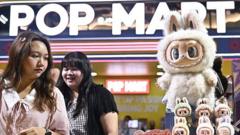Pop Mart, headquartered in Beijing, now boasts a stock market valuation exceeding $40 billion (£31.6 billion), attributed to broader brand recognition and prudent cost management strategies. The company's signature product, the Labubu dolls—distinctive toy figures resembling cartoonish elf-like creatures—have captivated collectors, resulting in massive demand and long queues in stores worldwide.
Launched in 2019, these viral dolls have positioned Pop Mart as a leading retailer, with a global presence spanning over 2,000 vending machines and storefronts. The company first made waves by listing its shares on the Hong Kong Stock Exchange in 2020, witnessing nearly 600% growth in its stock valuation this past year.
Notably, nearly 40% of Pop Mart's revenue in 2024 now originates from outside mainland China, with international sales significantly bolstered by high-profile endorsements from celebrities like Kim Kardashian and Lisa from the K-pop group Blackpink. Amidst this frenzy, sales in the United States saw an astounding increase of 5,000% year-on-year in June, according to M Science.
The company's unique marketing strategy often involves selling toys in "blind boxes," a practice that has attracted scrutiny for promoting compulsive purchasing behavior. Nevertheless, the immense popularity of Labubu dolls has led to extreme supply shortages globally, with numerous retailers halting sales temporarily.
In addition to expanding its consumer base, Pop Mart has established partnerships with iconic brands such as Coca-Cola and the manga franchise One Piece, further amplifying the Labubu doll's market presence. This fervor has ignited a thriving resale market, with dolls that initially retailed for around $10 now fetching exorbitant prices; a life-size Labubu recently fetched $150,000 at an auction in Beijing.
However, the rapid escalation in popularity has also given rise to counterfeit products, like the so-called Lafufu dolls. Authorities in China recently confiscated over 46,000 counterfeit Labubu toys in an effort to combat the booming black market surrounding these beloved dolls.
In summary, Labubu dolls are not just toys; they are a cultural phenomenon, showcasing the possibilities within the toy industry while also highlighting challenges related to market demand and counterfeit products.
Launched in 2019, these viral dolls have positioned Pop Mart as a leading retailer, with a global presence spanning over 2,000 vending machines and storefronts. The company first made waves by listing its shares on the Hong Kong Stock Exchange in 2020, witnessing nearly 600% growth in its stock valuation this past year.
Notably, nearly 40% of Pop Mart's revenue in 2024 now originates from outside mainland China, with international sales significantly bolstered by high-profile endorsements from celebrities like Kim Kardashian and Lisa from the K-pop group Blackpink. Amidst this frenzy, sales in the United States saw an astounding increase of 5,000% year-on-year in June, according to M Science.
The company's unique marketing strategy often involves selling toys in "blind boxes," a practice that has attracted scrutiny for promoting compulsive purchasing behavior. Nevertheless, the immense popularity of Labubu dolls has led to extreme supply shortages globally, with numerous retailers halting sales temporarily.
In addition to expanding its consumer base, Pop Mart has established partnerships with iconic brands such as Coca-Cola and the manga franchise One Piece, further amplifying the Labubu doll's market presence. This fervor has ignited a thriving resale market, with dolls that initially retailed for around $10 now fetching exorbitant prices; a life-size Labubu recently fetched $150,000 at an auction in Beijing.
However, the rapid escalation in popularity has also given rise to counterfeit products, like the so-called Lafufu dolls. Authorities in China recently confiscated over 46,000 counterfeit Labubu toys in an effort to combat the booming black market surrounding these beloved dolls.
In summary, Labubu dolls are not just toys; they are a cultural phenomenon, showcasing the possibilities within the toy industry while also highlighting challenges related to market demand and counterfeit products.















